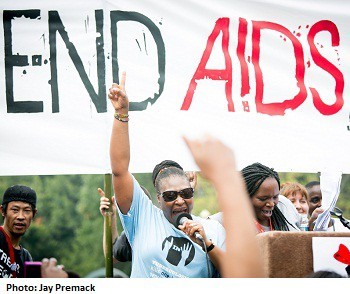
Yvonne Chaka Chaka raising her voice on HIV/AIDS & TB w/ @action_tweets at #AIDS2012 rally.
The first AIDS "activist" I knew was a man who cared for his partner until his death from HIV/AIDS. I learned quietly over the years from him how you fight pain, loss, discrimination and setbacks, with love, beauty and grace. I didn't know I was learning it at the time. It just was.
I like a fight. Not violence, but a good worthwhile slog for something that matters. And I like fighters. And maybe that's how I stumbled into the HIV/AIDS community all those years ago. It's a community full of fighters -- men and women prepared for the long game against the health injustice that means that who you are and where you live determines whether or not this disease or another will kill you -- or not. AIDS researchers, health workers and activists are prepared for a long hard fight but through their efforts, are making it shorter.
It's a community that can weather tough times, take a punch, get up and keep fighting.
This tenacity and vision has led to a revolution in human health history. Even without a cure -- with the strategies for prevention and treatment that have been developed and with the policies put in place to fight discrimination in access to treatment -- we have now begun to talk about "the end of AIDS."
When you fight, sometimes you get hurt. Even in a community born of suffering, of loss and outrage the senselessness can sometimes be too much. So it felt when the announcement that possibly more than 100 AIDS activists, researchers and experts had been lost on Malaysian flight 17. I know I was not alone in scrambling to find out where several close friends were.
It looks now like the loss will be much lower in numbers. This is small comfort. But for those headed to the HIV/AIDS Conference in Melbourne on fight on Flight 17, their lives were not more valuable than any other lives, and they would have been the very first people to tell you that.
That was always the whole point.
But, for their families and their extended family -- the thousands of grassroots volunteers, doctors, nurses, community health workers, activists and political leaders who fought quietly or loud as hell along side them, and for those they fought for -- well that's just not true.
Not right now.
Right now it feels like we lost something of the best in us as humans. But the AIDS community has a long history of mourning by fighting. Taking this punch and getting up to fight harder.
And that's what happens next.
--
Kolleen Bouchane is the Director of Policy and Advocacy for A World At School and Director of Policy and Research for the Global Business Coalition for Education. If all children received a complete primary education, around 700,000 cases of HIV in young adults could be prevented each year--seven million in a decade.
